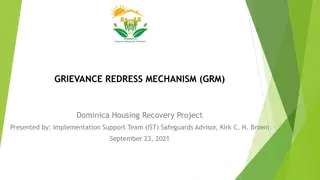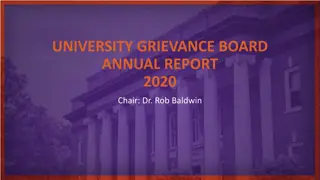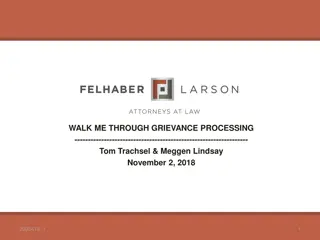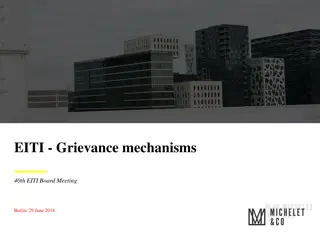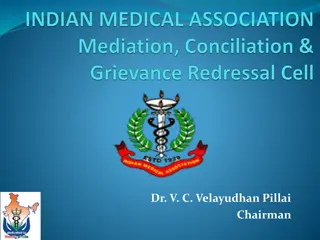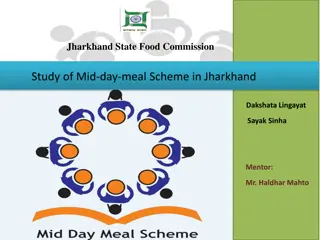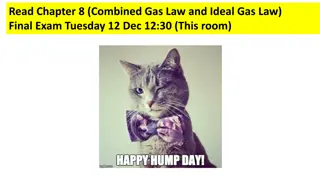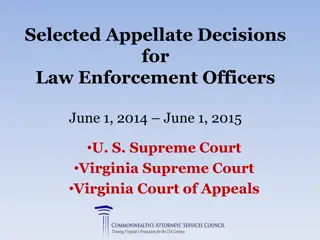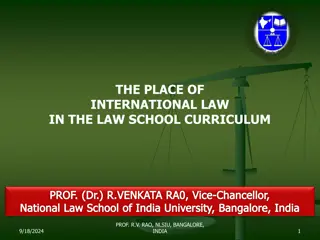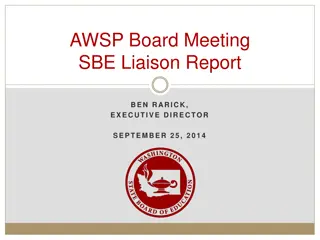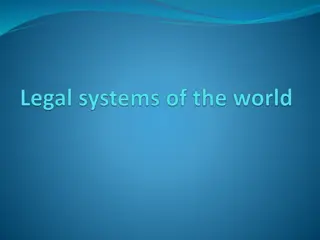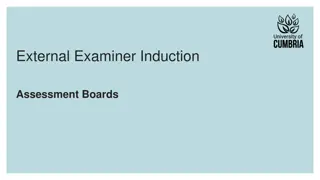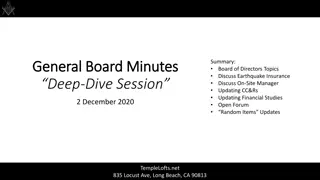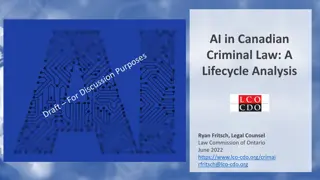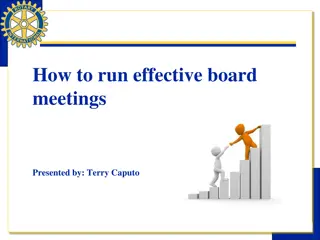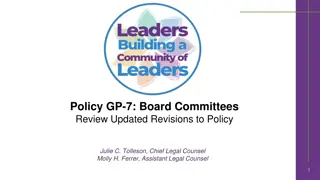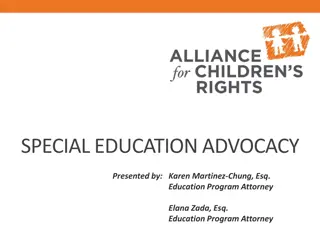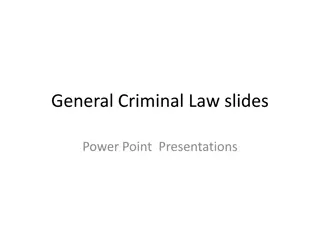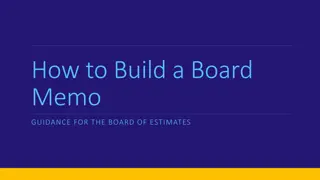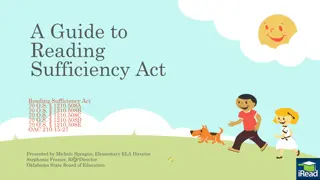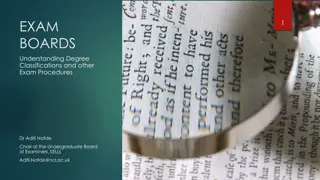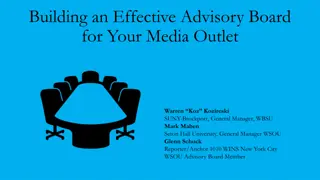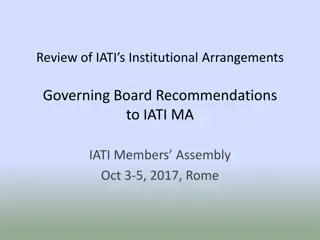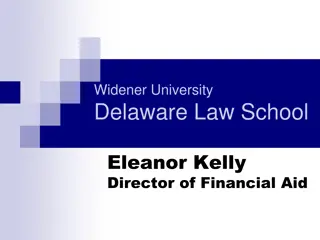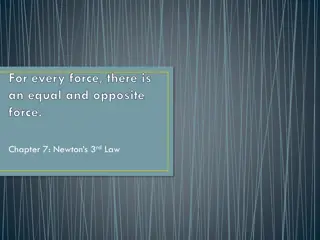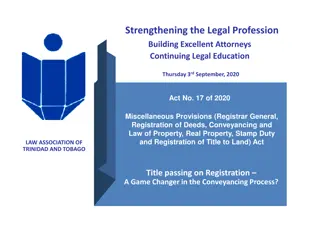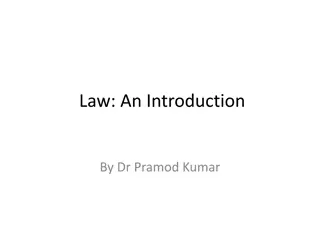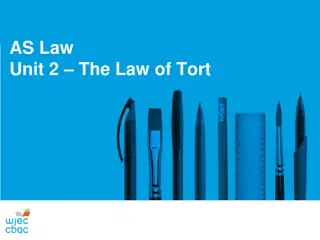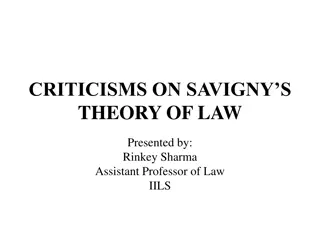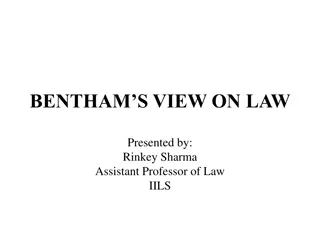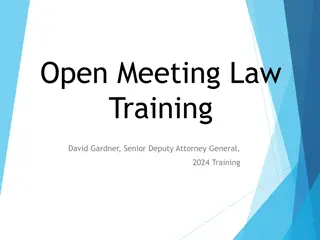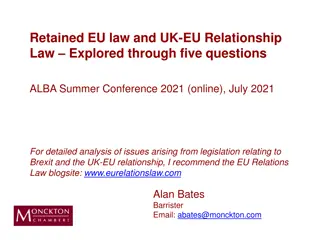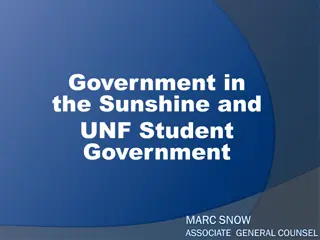Grievance Board Decisions in Education Law
Explore recent Grievance Board decisions in education law involving salary computation errors and past mistakes affecting entitlements. Consider the factors influencing discretionary decisions by employers. Caution: This information is not legal advice; contact an attorney for legal counsel.
Download Presentation

Please find below an Image/Link to download the presentation.
The content on the website is provided AS IS for your information and personal use only. It may not be sold, licensed, or shared on other websites without obtaining consent from the author. Download presentation by click this link. If you encounter any issues during the download, it is possible that the publisher has removed the file from their server.
E N D
Presentation Transcript
Scary Legal Stuff ! from your friends at Bowles Rice
Caution Be Forewarned ! THIS IS NOT LEGAL ADVICE THIS IS NOT LEGAL ADVICE THE LAW CHANGES RAPIDLY THE LAW CHANGES RAPIDLY DO NOT RELY ON A SLIDE SHOW TO DO NOT RELY ON A SLIDE SHOW TO TAKE ANY ACTION TAKE ANY ACTION CONTACT AN ATTORNEY FOR LEGAL CONTACT AN ATTORNEY FOR LEGAL ADVICE ADVICE
Bowles Rice Education Law Group Rick Boothby Kayla Cook Josh Cottle Kim Croyle Roger Hunter Julie Moore Top Ranked in Education Law Trey Morrone Howard Seufer Leigh Anne Wilson
Our Topics Today Decisions from the Grievance Board Decision from the Intermediate Court of Appeal Decisions from the West Virginia Supreme Court of Appeals Ethics Commission Advisory Opinions Red Flag Legal Issues Analysis of Legislative Mandates, Funding and Education Model
Grievance Board Miker v. Monongalia County Board of Education, Docket No. 2022-0581-MonED (November 1, 2022) Grievant was employed as a heating, ventilation, and air conditioning teacher. Grievant s starting salary was based on 28 years of experience for private sector work in the field. An audit conducted in 2013 concluded that Grievant was improperly paid for these years of experience. No action was taken by Grievant at that time. In December of 2021, Grievant obtained a Bachelor s degree and was awarded a pay increase consistent with the salary schedule.
Grievance Board Miker v. Monongalia County Board of Education, Docket No. 2022-0581-MonED (November 1, 2022) Grievant then sought 28 years of work experience. The record established that the initial years of experience had been awarded in error. Grievant s private sector experience did not comply with the statutory definition for years of experience for salary computation.
Grievance Board Miker v. Monongalia County Board of Education, Docket No. 2022-0581-MonED (November 1, 2022) A deviation from past practice is one of a number of factors to be considered when determining if a discretionary decision by an employer is arbitrary and capricious. Additionally, prior mistakes do not create an entitlement to future incorrect reimbursement or compensation.
Grievance Board Decisions Latta v. Taylor County Board of Education, Docket No. 2022-0696-CONS (January 23, 2023) Grievants are employed as multiclassified service personnel. Grievants contend that they should have received the same opportunity as a coworker for overtime/extra duty work. Overtime assignments for service personnel are considered extra duty work to be rotated among employees in the particular job classification. For multiclassified employees, the work would only be distributed among employees with all the same classifications. Grievants were not in the same job classification for the purpose of distribution of overtime work.
Grievance Board Decisions Latta v. Taylor County Board of Education, Docket No. 2022-0696-CONS (January 23, 2023) Occasional assignments beyond normal work hours are considered extra duty work, to be distributed among service employees in the applicable job classification in seniority order. Multiclassified employees are only entitled to be placed in rotation for extra duty assignments withing the same multiclassified job title. In order for a grievant to demonstrate entitlement to a position or compensation, it is necessary to establish that he or she was next in line. Grievants failed to establish that they were next in line for any particular extra duty assignments
Grievance Board Butcher v. Marion County Board of Education, Docket No. 2023-0345-MrnED (April 26, 2023) Grievant was employed as a custodian by the school board After becoming seriously ill, he was placed on unpaid leave. The leave was extended multiple times over 21 months before a new superintendent refused to extend unpaid leaves of absence beyond a year. In conjunction with amended policy, the school board then provided Grievant unpaid leave for another twelve weeks. Subsequently, Grievant did not show up to work for another nine months, rendering her absence unauthorized.
Grievance Board Butcher v. Marion County Board of Education, Docket No. 2023-0345-MrnED (April 26, 2023) The school board terminated Grievant s employment Grievant claimed that Code and policy mandated that her absence from work was not a valid reason for dismissal and that Respondent again extend her leave of absence. That a school board has the authority to extend an employee's unpaid leave of absence beyond one year does not itself obligate it to do so. Public employees are not entitled to endless leaves of absence.
Grievance Board Butcher v. Marion County Board of Education, Docket No. 2023-0345-MrnED (April 26, 2023) Was her conduct correctable? Not showing up to work may qualify as correctable unsatisfactory performance if the employee's failure to show up is simply a matter of competence rather than willful. But it may not be correctable if the employee, having been absent without leave for a long time, is physically unable to return and an improvement period would not result in them doing so. Grievant did not prove she was entitled to more unpaid leave or that her dismissal was unlawful or unreasonable.
Grievance Board Decisions Adams v. Boone County Board of Education, Docket No. 2021- 1037-CONS (May 31, 2023) Grievants received a settlement in a prior grievance. Thereafter, the school board extended the same settlement payment to all employees Grievants assert was improper. Grievants sought compensation for the time spent pursuing the previous grievance, arguing they are entitled to compensation because of the school board s alleged improper action in paying all employees the same payment.
Grievance Board Decisions Adams v. Boone County Board of Education, Docket No. 2021-1037-CONS (May 31, 2023) Compensation for employees' time spent pursuing a previous grievance is relief that is unavailable from the Grievance Board. The grievance procedure allows an employee four hours of work time without charge to annual leave to prepare a grievance. To award compensation beyond that amount would not comply with the statute and would be akin to awarding attorney's fees, which are unavailable. Any expenses incurred relative to the grievance procedure at levels one, two and three shall be borne by the party incurring the expenses.
Grievance Board Decisions Adams v. Boone County Board of Education, Docket No. 2021-1037-CONS (May 31, 2023) The current grievance procedure does not provide for "fair and equitable relief. Damages such as medical expenses, mental anguish, stress, and pain and suffering are generally viewed as tort-like damages which have been found to be unavailable under the Grievance Procedure. When it is not possible for any actual relief to be granted, any ruling issued by the Grievance Board would merely be an advisory opinion.
Grievance Board Decisions Grievant claims that the school board lacked authority to award seniority to another employee who had been misclassified. The reclassification of the other employee placed that employee ahead of Grievant on the seniority list for that classification.
Grievance Board Decisions County boards are obligated to properly classify their service employees. There exists an affirmative duty to correct an error in classification when a superintendent becomes aware of sufficient information that such an error has occurred. Correction of misclassification also requires granting associated benefits. When an employee has been placed in the wrong classification, the correction of their misclassification entitles them to seniority credit earned while performing the duties of the proper job title.
Intermediate Appeals Court Decisions Hallman-Warner v. Bluefield State College Board of Directors, No. 22-ICA-38 (March 6, 2023) (memorandum opinion) A confidential settlement agreement was entered into by the parties After entering into the settlement agreement, the employee brought a suit pro se to invalidate the settlement agreement Her former attorney, at the request of the circuit court, filed a response to her suit and stated that the settlement agreement was understood and agreed to by all parties after considerable contemplation Bluefield State College responded and argued that the agreement could not be invalidated simply because she simply changed her mind
Intermediate Appeals Court Decisions Hallman-Warner v. Bluefield State College Board of Directors, No. 22-ICA-38 (March 6, 2023) (memorandum opinion) Because the law favors and encourages the resolution of controversies by contracts of compromise and settlement rather than litigation, it is the policy of the law to uphold and enforce such contracts if they are fairly made and not in contravention of some law or public policy. A party to such agreement seeking to re-open the same on any such grounds must distinctly allege and by clear and convincing evidence prove the particular facts of which such accident, mistake or fraud consists. Duress is not shown because one party to the contract has driven a hard bargain. Once a competent party makes a settlement and acts affirmatively to enter into the settlement, his second thought at a later time as to the wisdom of the settlement does not constitute good cause for setting it aside.
West Virginia Supreme Court Decisions BERKELEY COUNTY COUNCIL V. GOVERNMENT PROPERTIES INCOME TRUST, LLC, NO. 20-1019 (NOVEMBER 10, 2022) Ad valorem property taxes taxation shall be equal and uniform throughout the state, and all property, both real and personal, shall be taxed in proportion to its value to be ascertained as directed by law, W.Va. CONST. art. X, 1. Under Article X, Section 1b of our Constitution, the assessed value of such property is capped at 60% of its value, less than its true and actual value. Property owners may challenge or protest ad valorem assessments of property they own
West Virginia Supreme Court Decisions BERKELEY COUNTY COUNCIL V. GOVERNMENT PROPERTIES INCOME TRUST, LLC, NO. 20-1019 (NOVEMBER 10, 2022) Valuations for taxation purposes fixed by an assessing officer are presumed to be correct. The burden of showing an assessment to be erroneous is upon the taxpayer, and proof of such fact must be clear. The Taxpayers clearly did not meet their burden before the circuit court to show their assessments were erroneous.
West Virginia Supreme Court Decisions House Bill 2013, or the HOPE Scholarship Act was enacted by the Legislature in March of 2021 The Act created the Hope Scholarship Program to provide the option for a parent to better meet the individual education needs of his or her eligible child. To accomplish this goal, the Act created education-savings accounts that may only be used for specific educational purposes.
West Virginia Supreme Court Decisions STATE V. BEAVER, NO. 22-616 (NOVEMBER 17, 2022) Travis Beaver and Wendy Peters ( Respondents ), filed the initial complaint in the Circuit Court of Kanawha County on January 19, 2022, arguing that the Act was unconstitutional. They sought injunctive and declaratory relief. Katie Switzer and Jennifer Compton ( Petitioners ) argued that the Act was constitutional, and they both asserted that they were relying on Hope Scholarship funds to educate their children. The circuit court found that the Act exceeds the Constitution by authorizing a separate system of education, governed by a separate board, funded by West Virginia taxpayer money.
West Virginia Supreme Court Decisions STATE V. BEAVER, NO. 22-616 (NOVEMBER 17, 2022) The amount of each individual Hope Scholarship equals the prior year s statewide average net aid share allotted per pupil in a public school, based on net enrollment adjusted for state aid purposes[.] Id. 18-31-6(b). If a student does not spend the entire fiscal year in the program, the scholarship is prorated accordingly. Id. Further, Hope Scholarship funds may not be refunded, rebated, or shared with a parent or student in any manner. Any refund or rebate for goods or services purchased with Hope Scholarship funds shall be credited directly to a student s Hope Scholarship account. Id. 18- 31-7(c).
West Virginia Supreme Court Decisions STATE V. BEAVER, NO. 22-616 (NOVEMBER 17, 2022) Each current Hope Scholarship recipient would receive approximately $4,300 in their education-savings account. The West Virginia Supreme Court of Appeals found that the Kanawha County Circuit Court erred by finding the Act unconstitutional, and abused its discretion by permanently enjoining the State from implementing the Act. The Supreme Court of Appeals reversed the circuit court s order and dissolved the permanent injunction it had entered. The case was remanded to the circuit court with directions for it to enter judgment in favor of the two intervenors who alleged the Act was constitutional
West Virginia Supreme Court Decisions DONALD W. V. MONROE COUNTY BOARD OF EDUCATION, NO. 22-0086 (APRIL 5, 2023) (MEMORANDUM OPINION) The central question is this case was whether a bus operator was negligent This question is important when looking the potential liability for school boards Generally speaking, school boards enjoy immunity from liability from claims of negligence under the Governmental Tort Claims and Insurance Reform Act ( Tort Claims Act ), W. Va. Code 29- 12A-4(c) However, a school board may be stripped of immunity if the injured party can establish negligence on behalf of the county board
West Virginia Supreme Court Decisions To show a school board was negligent and strip it of immunity, a plaintiff must show the board (1) owed a duty to the student, (2) breached that duty, and (3) the breach proximately caused the injury. Also, it is not feasible for school employees to be able to see what every student is doing at every moment throughout a school day. no indication the bus driver breached a duty of care toward the injured part and, accordingly, could not be found negligent. In the absence of negligence by the bus driver, petitioners negligent training and supervision claims against the Board must also fail as a matter of law.
Ethics Commission Advisory Opinions The requirement under the Open Meetings Act that a meeting be open does not mean that a governing body must provide a physical meeting space The Act requires only that citizens be given access to a meeting by telephone conferencing or other electronic means. Open Meetings Opinion No. 2023-10 (March 2, 2023)
Red Misuse of School Facilities for Profit
Red The Overeager Volunteer Treasurer/Ticket Taker/Fund Raiser
Analysis of Legislative Mandates, Funding, and Education Models
Education Models for West Virginias public schools regular public schools, charter schools, microschools, learning pods, home schools, and private schools Analysis of funding sources The role of the Hope Scholarship Comparing the Education Models student athletic opportunities the application of school personnel laws the application of school accountability measures, the application of purchasing and other financial management rules the application of other school laws and policies
CHART Comparing the Education Models (Handout)
ANALYSIS AND STUDY Mandates, funding and educational models from the Legislature West Virginia public schools, charter schools, micro-schools, learning pods and private schools
FUNDAMENTALS Statutory and Constitutional Requirements
Fundamental Statutory and Constitutional Requirements The Constitution of West Virginia provides that the Legislature shall provide, by general law, for a thorough and efficient system of free schools. The Supreme Court of Appeals of West Virginia has held the mandatory requirements of a thorough and efficient system of free schools, found in Article XII, Section 1 of the West Virginia Constitution, make education a fundamental, constitutional right in this State; and, therefore, requires the Legislature to develop a high quality statewide education system.
FUNDAMENTALS The Compulsory School Attendance Statute
Compulsory School Attendance Statute The Legislature mandates compulsory school attendance for all school-aged children. The compulsory school attendance statute creates the basis for the Educational Models discussed in this report. The compulsory school attendance statute provides that a child is exempt from the compulsory school attendance requirement set forth in the code if the requirements relating to instruction in a private, parochial, or other approved school are met. The statute thereafter establishes the meaning and definitions of private, parochial, and other approved school and the requirements for each.
FUNDAMENTALS Learning Pods and Micro-Schools
Learning Pods and Microschools Learning pods are a voluntary association of parents choosing to group their children together to participate in their elementary or secondary academic studies as an alternative to enrolling in a public school, private school, homeschool, or microschool, including participation in an activity or service provided to the children in exchange for payment;
Learning Pods and Microschools Microschool (aka, micro-school) means a school initiated by one or more teachers or an entity created to operate a school that charges tuition for the students who enroll and is an alternative to enrolling in a public school, private school, homeschool, or learning pod.
FUNDAMENTALS Private or Parochial Schools


